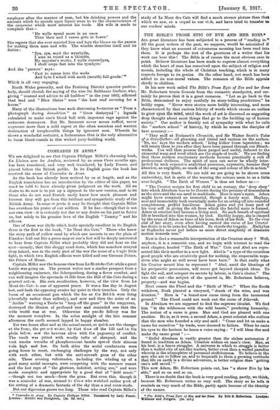COMRADES IN ARMS, WE are delighted to see that Captain
Philippe Millet's charming book, En Liaison avec lee Anglaia, reviewed by us some three months ago, has been translated, and very well translated, by Lady Frazer, and placed before the British public. In its English guise the book has received the name of Comrades in Arms.
As the book has already been noticed by us at length, and as the English translation has an introduction by the editor of this paper, we must be held to have already given judgment on the work. All we desire to do now is to put up a signpost to the new version, and to let those who do not read French easily know how much pleasure and interest they will get from this brilliant and sympathetic study of the British Army. In some re pacts it may be thought that Captain Millet has overdone his praise of our soldiers. If he has—though that is not our own view—it is certainly not duo to any desire on his part to flatter us, but solely to his genuine love of the English " Tommy " and his officers.
One of these war idylls which looks specially excellent in its English dress is the first in the book, " Le Mont des Cats." Those who know the steep path of yellow sand by which one mounts to sea the plain of Flanders laid out like a green map at one's feet will be deeply interested to hear from Captain Millet what probably they did not hear on the spot—namely, that this shaggy sand dune, which has somehow strayed deep inland, was in the early part of the war the scene of a tragic little fight, in which two English officers were killed and one German Prince, the Prince of Hesse.
Captain Millet saw the famous view from Le Mont des Cats while a great battle was going on. The present writer saw a similar prospect from a neighbouring eminence, the Scherpenberg, during a fierce combat, and can well imagine the spectacle visible from the Bill of the Cats during a general acttcm. His own recollection, however, of the view from Le Mont des Cats is one of apparent peace. It was a fine day in August last, and both the opposing armies lay quiet in their trenches. Only the boom of an occasional gun which the foe or the Briti3h were firing (cheerfully rather than sullenly), and now and then tho noise of an " Archie " warning a Taube to " keep off the grass " in the empyrean, destroyed the illusion of profound rest and reminded one that the wide world was at war. Otherwise the pacific fallacy was for the moment complete. In the sober sunlight of the late summer afternoon the earth seemed lapped in happy slumber.
Yet two hours after and at the actual sunset, so quick are the changes at the front, the present writer, by that time off the hill and in the plain below, saw the heavens alive with the pageantry of conflict. The vault was pitted with woolly tufts of shrapnel, and the vast smoke wreaths of phosphorescent bombs spread their sinuous toils high and low. On both sides the aerial combatants were going home to roost, exchanging challenges by the way, not only with each other, but with the anti-aircraft guns of the other side. These evening voluntaries, including the winding up of a good many aerial sausages, were competing with the summer sunset and the last rays of " the glorious, indolent, setting sun," and were made complete and appropriate by a good deal of " field music " —though not too much—from the guns. But even this, though it was a reminder of war, seemed to those who watched rather part of the setting of a dramatic fantasia of the sky than a real cannonade.
But our digression grows too long. Those who read Captain Millet's
• Comrades in Arms. By Captain Philippe Millet.- Translated by Lady Frazer. London Hodder and Stoughton. 13s. 6& ukt.1
study of Le Mont des Cats will find a much sterner picture than that which we saw, as a sequel to our vide and have tried to transfer to our readers' minds.










































 Previous page
Previous page